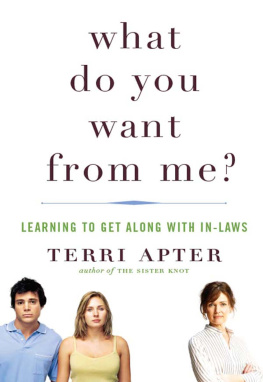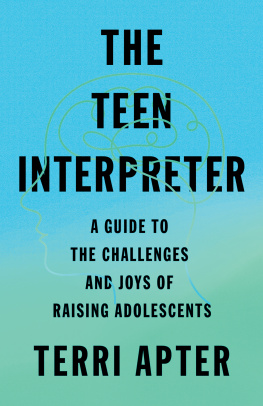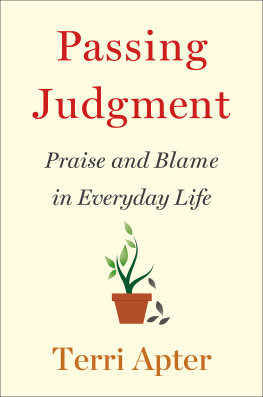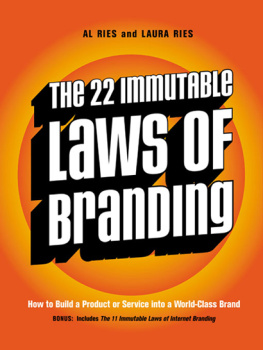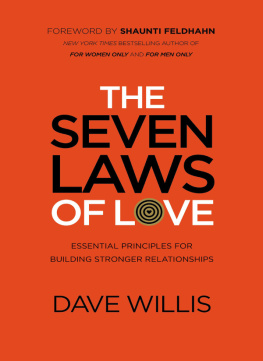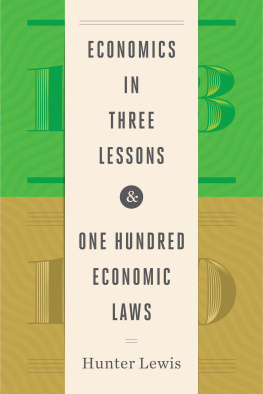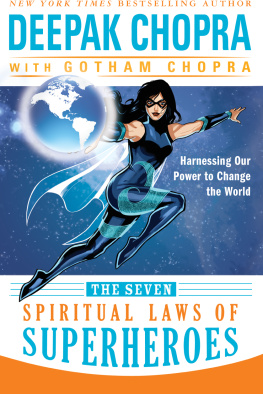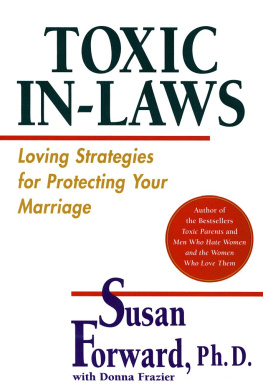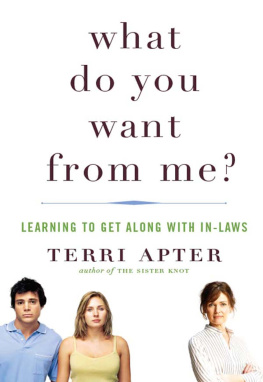The Sister Knot: Why We Fight, Why Were Jealous, and Why Well Love Each Other No Matter What
Best Friends: The Perils and Pleasures of Girls and Womens Friendships (with Ruthellen Josselson)
WHAT DO YOU WANT FROM ME?
Learning to Get Along with In-Laws
TERRI APTER

W. W. NORTON & COMPANY
New York London
Copyright 2009 by Terri Apter
All rights reserved
For information about permission to reproduce selections from this book,
write to Permissions, W. W. Norton & Company, Inc.,
500 Fifth Avenue, New York, NY 10110
Library of Congress Cataloging-in-Publication Data
Apter, T. E.
What do you want from me?: learning to get along with in-laws / Terri
Apter.1st ed.
p. cm.
Includes bibliographical references.
ISBN: 978-0-393-07288-4
1. Parents-in-law. 2. Interpersonal relations. I. Title.
HQ759.8.A68 2009
646.7'8dc22
2009013159
W. W. Norton & Company, Inc.
500 Fifth Avenue, New York, N.Y. 10110
www.wwnorton.com
W. W. Norton & Company Ltd.
Castle House, 75/76 Wells Street, London W1T 3QT
Contents
The Primary Source of Conflict
Insiders and Outsiders
Ideals and Competition
Why Its So Tough to Get Support from Your Spouse
Becoming a Mother-in-Law
Hard Lessons for Ordinary People
Becoming a Mother, Becoming a Grandmother
Gifts and Debts; Love and Gratitude
The Unexpected Impact of Siblings-in-Law
Divorce and Connection
Rifts and Reparation Across the Life Span
Acknowledgments
What Do You Want from Me? emerges from the rich stories provided by the people who have collaborated with me by being subjects of research. I ask a great deal of my interviewees: I ask them to reflect on difficult problems; I ask them to expose family tensions; and I ask them to tease out details of their own and others behavior that, ordinarily, they would prefer to ignore. They made records of family gatherings, sometimes by writing diaries, sometimes by taping their own commentaries on fluctuating thoughts and feelings and observations during family holidays, weekend visits, and even, in one case, a wedding. To the 49 families and 156 people who participated in my research, I owe everything.
I am so lucky to have Jill Bialosky at W. W. Norton as an editor who responds to proposals with imaginative and critical sympathy. Meg Ruley and Kelly Harms at Jane Rotrossen Agency were outstanding champions of this project from the outset, and guided me with keen eyes and good humor through a series of proposals.
My colleagues at Newnham are always ready to engage with my ideas; they offer valuable ongoing conversations in which I can test the resonance of themes that emerge in my research. Jenny Mander and Sheila Watts never let me let go of the subject of in-laws. Susan Golombok, Liba Taub, and Diana Lipton, with understated persistence, assured me that in-law relationships were worth further exploration. Their interest and encouragement kept this project in the forefront of my mind for many years.
Beverly and Alan Freid, with their Web site www.motherinlawstories.com, brought my work on in-laws to a global audience; they also brought me stories of people desperate to make sense of these compelling, challenging relationships. Since 1999, they have shared their fascination in this subject with me.
Even a brief conversation with Carol Gilligan can reframe entrenched assumptions, and, as always, I am grateful for her creative, imaginative engagement with my ideas. Janet Reibstein offered me the benefit of her many years experience as a marital therapist, and guided me through the structures of common interactions. Jeannette Josse generously set out a psychoanalytic template that explains common patterns of conflict.
A FINAL note about grammar: Following rules of grammar strictly sometimes leads to awkward-sounding phrases; in this book, I often follow my ear, rather than strict rules of grammar, in using the plural and possessive forms of in-laws. Also, I sometimes use the plural they in cases that grammatically require the singular he or she. And I sometimes use she or he to designate any person when the matter is more likely to involve women or men; this is not intended to exclude anyone of either gender from the full range of experiences. The words I use are chosen for ease and immediacy, and I hope my choices will be tolerated.
Introduction
WHEN I was first married, as a very young woman, I believed that I was embarking on a partnership between two people, and only two. As a typical twentieth-century woman, I imagined that once we called ourselves grown-ups, we snapped those childhood bonds to parents, and slipped into adult life with neat, clean boundaries. I had no inkling of the range of influences or the pull of old bonds that would gradually be exposedstrong, stubborn, and exacting. Consequently, I lacked foresight of the power that would be wielded by a family who I initially supposed were mere add-ons to my husband. In short, I failed to measure the impact my in-laws would have on my marriage, my personal life, and my well-being.
At the same time, one of the many things I found so attractive in my husband was his capacity for love, loyalty, and attachment. I admired the spontaneous decency that bound him to his mother, his father, and his sister. Oblivious to my inconsistency, my view was skewed by self-interest. I saw his family ties as indicators of strong future attachments to his own wife and children, but without force in and of themselves. Not only did I assume that my parents-in-law would be marginal players in my own life, I expected that whatever impact they had would decrease further as we established ourselves as a couple, the primary group of our very own family. Growing up, I thought, meant that the older generation ceased to matter.
I never expected that my in-laws would shape as many of my day-to-day thoughts and moods as they in fact have, that they would color my sense of who I am and what Im worth in the family, or that their needs would stake such a large claim on family decisions. In short, like many people embarking on marriage, I failed to gauge the inescapable power of in-laws.
Now, as a parent facing the transition to mother-in-law, I have a very different view, though this new perspective is perhaps equally skewed by self-interest. The bond I have with my children, whatever their age, however mature and independent they become, is forever, and, from my perspective, will not diminish when they marry. My own childrens interests will continue to take priority on any and every scale, and I will measure their partners according to their value and benefit to my own children. I will try to follow reasonable rules about privacy and boundaries, but my maternal heart will not be modified by common sense or wise precept. My research on in-laws suggests that my double-think places me in the majority.
The topic of in-laws is a lightning rod, charged with confusion and fear. That is one reason why jokes about in-laws are so common. Sometimes we laugh when we are anxious and bewildered. Through laughter, we can temporarily release tension and share our discomfort, but jokes do not provide the insight we need to manage these relationships. What is needed is deep understanding of the many levels on which the power of in-laws is enacted.

